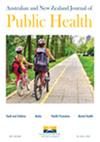一项横断面研究,内容是受困来电者从电话癌症信息和支持服务获取经济援助时的经历。
IF 2.4
3区 医学
Q2 PUBLIC, ENVIRONMENTAL & OCCUPATIONAL HEALTH
Australian and New Zealand Journal of Public Health
Pub Date : 2024-11-16
DOI:10.1016/j.anzjph.2024.100199
引用次数: 0
摘要
研究目的本研究旨在探讨癌症患者在被诊断为癌症后致电求助热线时对金融服务的提供和使用情况的体验:方法:癌症患者和护理人员报告他们是否讨论过并使用过金融服务,以及对服务使用情况的看法。结果:在 508 名癌症患者和护理人员中,有 1.5%的人在接受金融服务时,会对金融服务进行讨论:在抽样调查的 508 名患者和护理人员中,107 人(21%)回忆起曾讨论过财务支持问题,并使用了服务。其中 34 人(32%)转介了财务支持服务,32 人(94%)表示该支持服务很有帮助。在 401 人(79%)中,有 26 人(6%)不记得曾讨论过财务支持问题,但他们希望能讨论过。以下特征与讨论财务支持的可能性明显相关:年龄较小、已婚、转移性疾病、自付费用较高、没有私人医疗保险、正在休假以及缺勤天数较多:结论:尽管经济援助的使用者认为这些援助很有帮助,但仍需要更有条理的转介方法,以实现公平获取:提供癌症信息和支持的社区组织应采取积极主动的结构化方法来评估财务毒性并提供支持。本文章由计算机程序翻译,如有差异,请以英文原文为准。
A cross-sectional study of the experiences of distressed callers when accessing financial assistance from a telephone-based cancer information and support service
Objective
The objective of this study was to explore the experiences of distressed people calling helplines regarding offer and uptake of financial services after cancer diagnosis.
Methods
Cancer patients and caregivers reported whether they had discussed then used financial services and perceptions surrounding service uptake. Associations between being offered services and demographic, clinical and financial characteristics were explored.
Results
Of the 508 patients and caregivers in this sample, 107 (21%) people who recalled discussing financial support used the service. Of those, 34 (32%) participants actioned a financial support referral, of which 32 (94%) reported that the support was helpful. Of the 401 (79%) who did not recall discussing financial support, 26 (6%) would have liked to do so. The following characteristics were significantly associated with a greater likelihood of discussing financial support: younger age, being married, metastatic disease, higher out-of-pocket costs, not having private health insurance, being on leave and being absent for more days from work.
Conclusions
Although users of financial supports find them helpful, there is need for more structured approaches to referral to achieve equitable access.
Implications for public health
A pro-active, structured approach to assessing financial toxicity and offering support is warranted in community-based organisations that offer cancer information and support.
求助全文
通过发布文献求助,成功后即可免费获取论文全文。
去求助
来源期刊

Australian and New Zealand Journal of Public Health
医学-公共卫生、环境卫生与职业卫生
CiteScore
4.20
自引率
5.70%
发文量
121
审稿时长
6-12 weeks
期刊介绍:
The Australian and New Zealand Journal of Public Health (ANZJPH) is concerned with public health issues. The research reported includes formal epidemiological inquiries into the correlates and causes of diseases and health-related behaviour, analyses of public policy affecting health and disease, and detailed studies of the cultures and social structures within which health and illness exist. The Journal is multidisciplinary and aims to publish methodologically sound research from any of the academic disciplines that constitute public health.
 求助内容:
求助内容: 应助结果提醒方式:
应助结果提醒方式:


